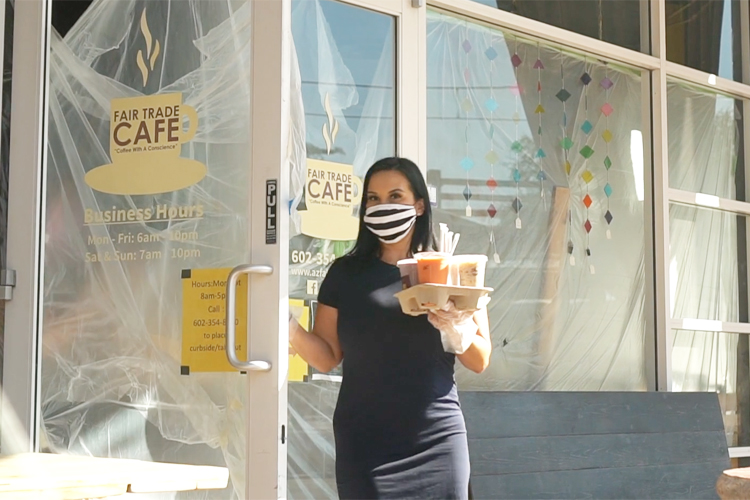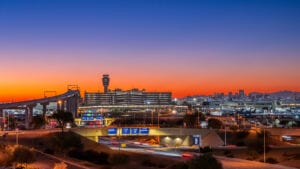Wednesday in Phoenix, two local Latina business owners issued an urgent call to make government assistance more accessible to small, minority-owned businesses like theirs. Amidst simmering coronavirus concerns and with Arizona in the political crosshairs of the 2020 race, the film, A Fair Shot For Fair Trade Cafe, sends a message to elected leaders to act urgently to aid struggling Arizonans and small businesses. In addition to the screening, the premiere featured a discussion with the film’s creator, participants and local business owners.
A Fair Shot profiles Phoenix native Stephanie Vasquez and her daughter Nadia as they navigated bureaucratic and emotional obstacles to access the government funding that Congress designated to help small businesses like Stephanie’s through the pandemic. The café, a neighborhood gathering place since it opened 14 years ago, lost 85% of its business even as it remained open for curbside pickup. While chain restaurants and Trump-connected companies and donors immediately obtained millions of government-backed Paycheck Protection Program (PPP) loans, small businesses like Stephanie’s were shut out of early rounds. When Vasquez finally secured a small grant, she used it 100% on payroll to bring back four employees before the money ran out.

The event’s panel discussion with Vasquez, fellow Phoenix restaurant owner Silvana Salcido Esparza and local small business community advocate Thomas L. Barr, highlighted the systemic factors and the human impact of relief funds disproportionately going to the rich and well-connected. Panelists called on policymakers to do more and urged everyone to vote.
“It is so crucial that not only the community supports us as a small business. We need our policies and our leaders to understand and reflect our stories, and to react quickly,” said Fair Trade Cafe owner Stephanie Vasquez, who was also the main subject of the short film. “My story is not unique to me alone. It really is symbolic of what most small business owners really are going through. We are four days into reopening our doors, you’ll see my fourth grader behind me – he’s at home [remote] school. This is what small business looks like.”
“We closed down because we were socially responsible. Because we felt that it was a necessary thing to immediately flatten the curve. Unfortunately, the PPP ‘relief’ fanned the flames of institutional, systemic racism, coupled with good old-fashioned cronyism. It sent a message to a person that looks like me – who’s a lesbian, who’s marginalized, who’s a Mexican – that PPP relief was just a dream. I went after it anyway. But I had to close a restaurant and cry on social media for somebody to feel sorry and give me some money for the PPP. If not for that, I would have been gone a long time ago. Not only is there racism, there’s ageism, too, and being poor. The pandemic is just really a magnifying glass,” said Silvana Salcido Esparza, owner of the award-winning Phoenix-based Barrio Café. “I really feel like my restaurant’s on a respirator. The easy road would be to sell what I got. But when I ask myself, ‘How about the staff? How about the people who’ve been with me minimum 12 years, to 24 years?’ That’s my family. I’m a Phoenician, a guerrera, soy mexicana. I cannot look the other way.”
“This pandemic exposes what we’ve known all along: our economic systems benefit large corporations, non-local businesses and people that are not in our communities and do not have the best interests of our communities in the forefront. Now it is more important than it’s ever been to not only support local businesses, but ensure that we educate ourselves, support communities of color and ensure that all businesses that are small or struggling have access to critical resources and the finances,” said Thomas L. Barr, executive director of Local First Arizona, an 18-year old advocacy group for local small business. “Small businesses are more likely to represent communities of color and business owners of color. A thriving economy is only going to happen through a strong small business infrastructure. People can help in a lot of different ways: through supporting businesses directly every day, through registering to vote, through ensuring that they’ve completed the census and are properly represented.”
“With A Fair Shot For Fair Trade Cafe, Brave New Films talked to people in Arizona to show exactly what it means when we read a statistic that says 21% of small businesses may go out of business permanently if they don’t receive more help. Think about what that means to people’s lives, not just those who are employed, but to the life of a community, to the fabric of our country if that number of small businesses – and maybe more – are no longer with us,” said Robert Greenwald, the film’s creator and Brave New Films president and founder. “People of color are disproportionately harmed when the deck is stacked, so that the big companies and the companies with lots and lots of money and resources and access are able to get millions and millions of dollars. Large corporations who have lobbyists, access to elected officials and access to banks are receiving a disproportionate amount of the money that’s been available through PPP. We must act: Advocate, organize, help spread the word and vote!”




